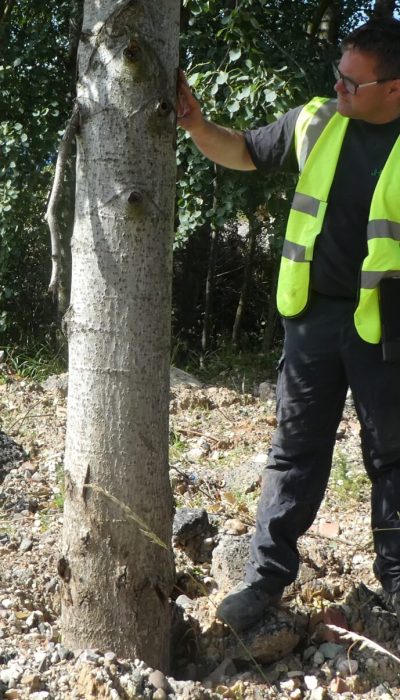Tree Surveys for Planning
BS 5837 surveys that identify tree constraints, protect your layout and give planners the evidence they need for validation and approval.
Tree constraints surface early in planning. Root protection areas, canopy spread, shading, retention categories and access routes all influence whether your design is workable. A Tree Survey for Planning sets out the facts clearly, helping your project progress without avoidable redesigns.
Where trees meet design, clarity avoids delays
Even small projects run into issues if tree constraints aren’t understood early. A planning-ready tree survey shows what can be retained, what can be removed and how your proposal interacts with every relevant tree.
What is a Tree Survey for Planning?
A Tree Survey for Planning establishes baseline arboricultural information under BS 5837, including:
- species, height and stem diameter
- crown spread, canopy form and condition
- root protection areas (RPAs)
- retention categories (A, B, C, U)
- life expectancy and management considerations
- constraints mapping for design teams
This survey forms the foundation of all BS 5837 planning work, including AIAs and Tree Protection Plans.

The Planning Tree Survey Process
| Step | Description |
|---|---|
| 1. Initial Review | Send your address, layout (if available) and any LPA notes. |
| 2. On-Site Survey | Measurement of all relevant trees and identification of constraints. |
| 3. Mapping & Interpretation | RPAs and crown spreads mapped for design reference. |
| 4. Recommendations | Guidance for design teams, including constraints and opportunities. |
| 5. Reporting | A planning-ready BS 5837 survey suitable for submission or use in an AIA. |
We keep guidance clear and planning-ready — supporting predictable project delivery.
Our Approach
Predictable Delivery
Clear reporting that keeps planning timelines stable.
Design Aware
Constraints explained in a way architects can use immediately.
Planning Focused
Reports designed to answer LPA questions up front.
Technical Clear
Clean, confident evidence aligned with BS 5837.
Do I need a Tree Survey for my application?
You’re likely to need a planning tree survey if:
- trees are on or near the development area
- access routes, foundations or services cross RPAs
- crown spread influences design or shading
- your LPA mentions BS 5837
- your architect highlights potential conflicts
- you’re proposing extensions, new builds or layout changes
- your PEA flags arboricultural constraints
If trees sit anywhere close to your proposal, planners will expect clear BS 5837 evidence.
Why this Matters for Planning
Trees are a material consideration under the Town & Country Planning Act 1990, and LPAs must ensure development respects BS 5837 guidance.
Clear evidence is essential for:
- validation
- retention decisions
- layout acceptability
- construction access
- mitigation requirements
- tree protection conditions
Weak or incomplete data leads to validation delays, requests for additional surveys or redesign.
Do I need a Tree Survey for my application?
A complete BS 5837 baseline survey:
- tree identification and condition assessment
- stem diameter, height and crown spread
- retention category allocation
- root protection area calculations
- life expectancy and management notes
- above- and below-ground constraints
- CAD-ready mapping (where required)
- planning-ready summary for decision-makers
Suitable For:
- extensions
- new builds
- multi-unit schemes
- commercial projects
- architects
- planning consultants
- property developers
Case Note
Baseline BS 5837 data showed one tree was suitable for retention, while the other had structural defects and limited life expectancy. Clear categorisation justified partial redesign and supported removal of the lower-quality tree. The updated layout was accepted without further arboricultural queries.
Your Next Step
Need a Tree Survey for Planning? Send your site details and we’ll confirm exactly what’s required.
Phone: 0800 494 7479
Email: [email protected]
Tree Survey FAQs
Do all planning applications need a tree survey?
No, only those with trees on or near the development area.
What does BS 5837 cover?
Tree quality, RPAs, condition and constraints affecting design and construction.
Is this enough for planning, or will I need an AIA?
If your design interacts with RPAs or crowns, planners often request an AIA as well.
Can a tree be removed if it’s low quality?
Yes, where justified. Retention categories guide this.
Do neighbour’s trees matter?
Yes. Trees outside your boundary can still constrain development.
Will the council accept this type of survey?
Yes. BS 5837 surveys are the required standard.
Does this replace a Tree Protection Plan?
No. TPPs are produced if development affects retained trees.
Do I need this for small extensions?
Often, yes, if trees sit within influence of the works.
How long is a survey valid?
Typically 12 months, depending on tree condition.
What information helps before the visit?
Address, layout, and any planning or architect notes.



